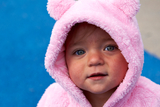

When Old Man Winter arrives, many common winter illnesses do, too. To be prepared for everything that winter brings, make sure your home first-aid kit is stocked and ready so you don't find yourself up late at night with a sick child — and no cold medicine.
Colds and flu
Check your first-aid cabinet and dispose of outdated items, then restock it with:
- Decongestants/cough suppressants to drain sinuses and stop overnight coughs. These medicines are not recommended for children younger than 6 years. Please check with your pediatrician before giving them to your child, and read and follow the directions on the label carefully.
- Antihistamines, which relieve symptoms like runny noses and itchy, watery eyes. These medicines also aren't recommended for children younger than 6 years, so check with your pediatrician before giving them to your child, and read and follow the directions on the label carefully.
- Acetaminophen (Tylenol®) or ibuprofen (Advil®, Motrin®) to relieve fevers or headaches. Only acetaminophen is approved for fever reduction in children younger than 1 year old. Older children can take ibuprofen if you prefer. Remember to follow the dosage instructions for your child's age and weight. Never give aspirin to children.
- Throat lozenges to relieve sore or dry throats during the day. Don’t give throat lozenges in bed, as your child may fall asleep with one in her mouth and choke on it.
- Saline drops for clogged noses in younger children. Use one to two drops in each nostril to offer some relief.
- Petroleum jelly or Aquaphor® to soothe red, raw noses.
- Vapor rub to help clear chest congestion in younger children.
- A humidifier to moisten the air in your child's room and help keep her comfortable when she is congested.
Burns
Spilled hot foods and liquids are the most common cause of burns in children. Around the holidays, kids are often helping with cooking or curious about what's in the pot. Prevent injuries by using your stove’s back burners as much as possible, and keeping pot handles turned toward the back of the stove.
Minor burns can be treated with cold water, cold compresses or an ice pack wrapped in a towel. To relieve discomfort from minor burns, you can use:
- Aloe gel, which stops the burning sensation
- Break-and-shake ice packs
Seek immediate medical care for burns that are more than 3 inches in size or appear to involve multiple layers of skin.
Other useful items
You may also want to add these items to your first-aid kit:
- Anti-diarrheal medicine (such as Imodium®) to control diarrhea (for kids 2 years and older)
- Motion sickness prevention medication (such as Dramamine®) (for kids 2 years and older)
- Antiseptic wipes
- Hydrogen peroxide to disinfect wounds
- Adhesive and gauze bandages
- Digital thermometer
Contributed by: Patrick S. Pasquariello Jr., MD

When Old Man Winter arrives, many common winter illnesses do, too. To be prepared for everything that winter brings, make sure your home first-aid kit is stocked and ready so you don't find yourself up late at night with a sick child — and no cold medicine.
Colds and flu
Check your first-aid cabinet and dispose of outdated items, then restock it with:
- Decongestants/cough suppressants to drain sinuses and stop overnight coughs. These medicines are not recommended for children younger than 6 years. Please check with your pediatrician before giving them to your child, and read and follow the directions on the label carefully.
- Antihistamines, which relieve symptoms like runny noses and itchy, watery eyes. These medicines also aren't recommended for children younger than 6 years, so check with your pediatrician before giving them to your child, and read and follow the directions on the label carefully.
- Acetaminophen (Tylenol®) or ibuprofen (Advil®, Motrin®) to relieve fevers or headaches. Only acetaminophen is approved for fever reduction in children younger than 1 year old. Older children can take ibuprofen if you prefer. Remember to follow the dosage instructions for your child's age and weight. Never give aspirin to children.
- Throat lozenges to relieve sore or dry throats during the day. Don’t give throat lozenges in bed, as your child may fall asleep with one in her mouth and choke on it.
- Saline drops for clogged noses in younger children. Use one to two drops in each nostril to offer some relief.
- Petroleum jelly or Aquaphor® to soothe red, raw noses.
- Vapor rub to help clear chest congestion in younger children.
- A humidifier to moisten the air in your child's room and help keep her comfortable when she is congested.
Burns
Spilled hot foods and liquids are the most common cause of burns in children. Around the holidays, kids are often helping with cooking or curious about what's in the pot. Prevent injuries by using your stove’s back burners as much as possible, and keeping pot handles turned toward the back of the stove.
Minor burns can be treated with cold water, cold compresses or an ice pack wrapped in a towel. To relieve discomfort from minor burns, you can use:
- Aloe gel, which stops the burning sensation
- Break-and-shake ice packs
Seek immediate medical care for burns that are more than 3 inches in size or appear to involve multiple layers of skin.
Other useful items
You may also want to add these items to your first-aid kit:
- Anti-diarrheal medicine (such as Imodium®) to control diarrhea (for kids 2 years and older)
- Motion sickness prevention medication (such as Dramamine®) (for kids 2 years and older)
- Antiseptic wipes
- Hydrogen peroxide to disinfect wounds
- Adhesive and gauze bandages
- Digital thermometer
Contributed by: Patrick S. Pasquariello Jr., MD